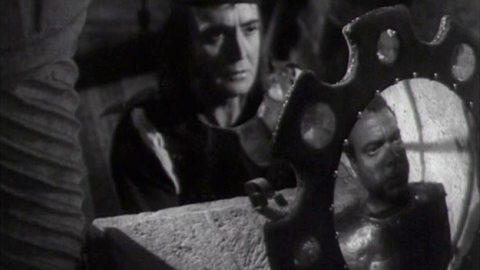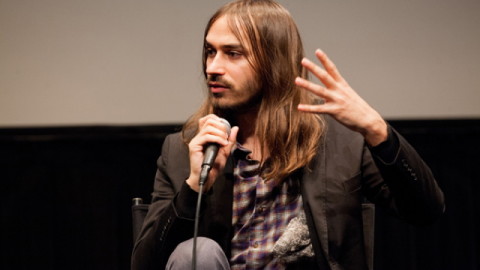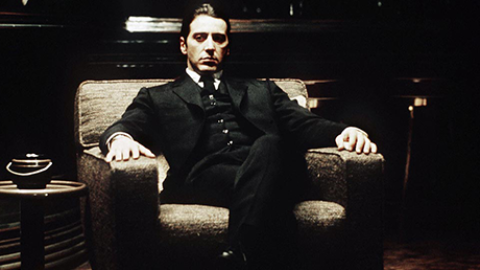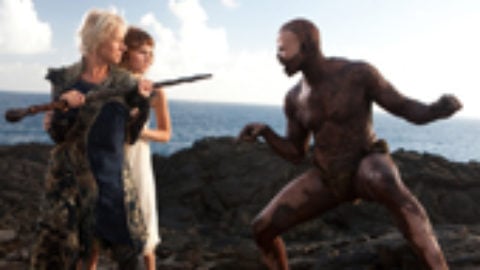Deep Focus: Macbeth
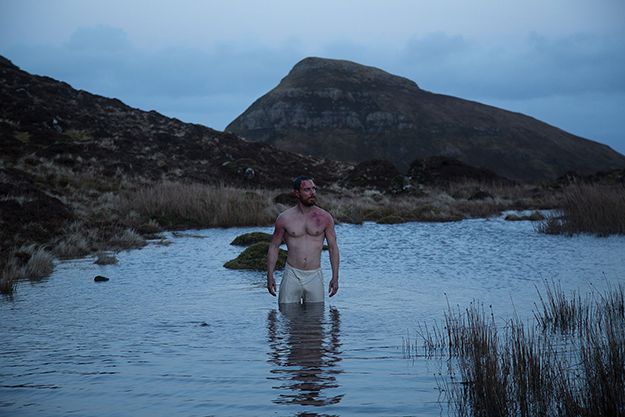
I’d been looking forward to Michael Fassbender’s interpretation of Macbeth. After actually seeing him star in Australian director Justin Kurzel’s version of “the Scottish play,” I’m still looking forward to it. Given the circumstances, Fassbender gets a mulligan. Kurzel and his three screenwriters (Todd Louiso & Jacob Koskoff, and Michael Lesslie) have drastically cut and reshaped Shakespeare’s text and swamped it in grime, gore, and murk. Even slashed to the bone, the words should still spill over with vitality and splendor, but the filmmakers bury them alive.
Stripped of rhythm, nuance, and grandeur, the verse functions as a prosaic device for delivering the plot. Macbeth becomes the simple story of a war hero egged on by his ambitious wife to attain the monarchy via regicide. The filmmakers place the action in an intensely physical world: the “blasted heaths” of Scotland as a barbarous frontier. They create an unholy combination of stark psychological motivation and bloody political bewilderment. In this film, Macbeth is struck with PTSD in a civil war so chaotic that you can tell the opponents apart only by smears of war paint.
Setting Macbeth in a context of anarchy could be liberating, a way of seeing the tragic hero’s eye for the main chance as his response to an unhinged era. But in this movie, the discord is merely generic and leveling. Likable figures such as the beneficent King Duncan (David Thewlis), who appoints Macbeth, already the Thane of Glamis, to be Thane of Cawdor (a “thane” was the noble chief of a shire), and Macbeth’s valorous, doomed best friend Banquo (Paddy Considine), get sucked into the miasma. The movie’s mesh of neurosis and psychosis and brute instinct affords the characters, and unfortunately the audience, no way out. At the end, the goal of all tragedy—catharsis—is nowhere to be found.
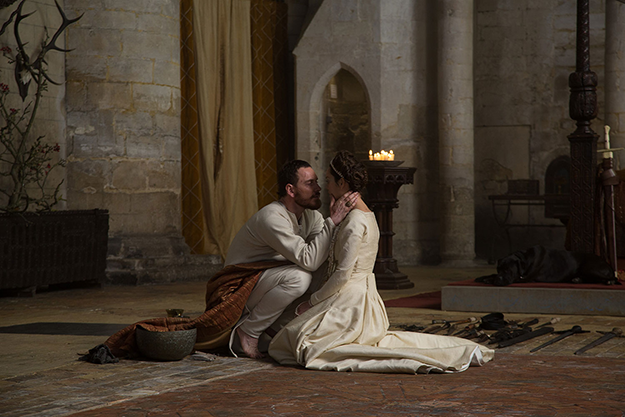
Nothing transcendent survives this version intact, not even Macbeth’s brilliant verbal breast-beating—the asides, monologues, and soliloquies that convey his vivid imagination and thus his tragic stature. Kurzel misdirects Fassbender to speak his lines as if he’s taking a polygraph: deliberately and flatly, whether he’s addressing a co-conspirator or just talking to himself. His delivery is so tight-lipped (and the photography often so dark) that you can’t tell when he’s moving his mouth or going in and out of voiceover. The entire cast comes down with the mumbles—and high drama is no place for low talkers.
Since the adapters do their job like dry nonfiction editors, dutifully setting anything on one topic in a single scene, the director scrambles to imbue the tragedy with an illusion of escalating drama. Paradoxically, he’s at his most straightforward when presenting the three witches—the “weird sisters”—who prophesy to Macbeth that he will become King of Scotland and tell Banquo that he will father a line of kings. Otherwise, even before Macbeth commits and/or orders multiple murders, Kurzel punctuates the action with flash-forwards and flashbacks—indeed, flash of any kind, including jolting cuts between stagey tableaux and closeup action, whether on the battlefield or in Macbeth’s court. The result is a trip movie—a bad-trip movie.
Even the film’s major innovation is reductive. If you wonder why Lady Macbeth (Marion Cotillard) is so swift to counsel regicide as she pushes her husband to the throne, Kurzel and company give you an immediate answer. She’s unbalanced from the start over the loss of her sole child (a son). The movie begins not with the three witches making an appointment to apprehend Macbeth but with the hero putting stones on his late boy’s eyes and hugging his wife as they witness the tiny corpse go up in flames on his bier. In a grim setpiece, the Thane, his wife, and their followers shroud themselves in dusky shawls. No wonder Lady Macbeth, too, sees the three witches at times of crisis. She’s got her own domestic form of PTSD. (To bolster his motherhood theme, Kurzel bequeaths the weird sisters a daughter—a witch-in-training—and a babe in arms.) Lady Macbeth takes their prediction that Macbeth will be king as a galvanizing piece of good news.
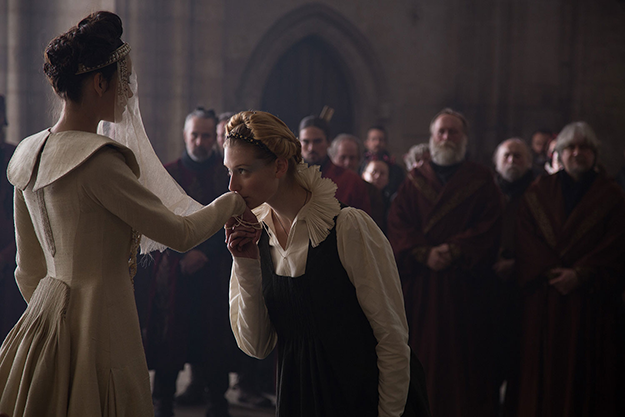
This interpretation is rooted in the text. “I have given suck and know / How tender ’tis to love the babe that milks me,” Lady Macbeth tells her husband, then continues: “I would, while it was smiling in my face, / Have plucked my nipple from his boneless gums / And dashed the brains out, had I so sworn as you / Have done to this.” The filmmakers are so lacking in emotional expressiveness or subtlety that this potentially feminist reading makes the action uglier. When Lady Macbeth advises her husband to “screw your courage to the sticking-place,” she actually screws him as she says so. It’s as if Kurzel and company mean to say that childless couples are ruled completely by their appetites.
Later, when Macbeth bemoans the witches’ proclamation that Banquo will be “father to a line of kings,” he addresses his complaint directly to his wife, and puts his dagger on her abdomen when he complains of his “barren scepter.” Are we meant to understand that he’s become sterile or that she’s now barren as well as childless? Lady Macbeth is a role that rises and falls on her consuming passion for her husband, but this film reserves her purest feeling for her child; as a wife, she’s all lust and ambition. Lady Macbeth gets shocked back into motherly empathy when she witnesses Macbeth burn Macduff’s wife and children at the stake. She ends up addressing her mad, eloquent regrets to a hallucination of her dead son, sitting in front of her. Not even an actress as teeming with inner life as Cotillard can surmount the cheap pathos of this notion.
In its own red-black-and-brown colors, Kurzel’s Macbeth is actually closer to Peter Brooks’s deadly gray version of King Lear than it is to other Macbeth films. Kurzel relies as much on his foggy Scottish locations as Brooks relies on his frigid Danish ones. Brooks’s men and women are bloodless; Kurzel’s are gory. Both casts are dehumanized.
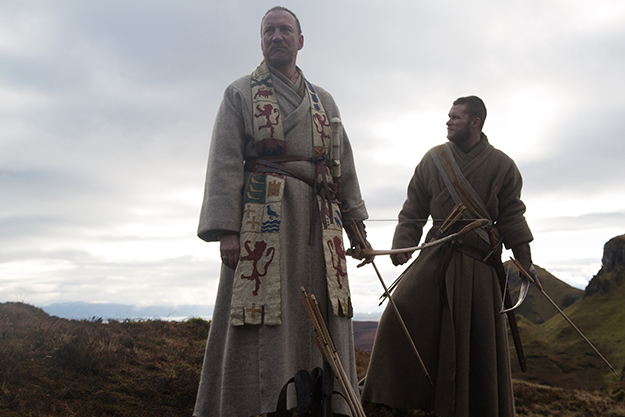
Despite the supposed curse on theatrical productions of “the Scottish play,” Macbeth has had an excellent run on screen. Orson Welles, in his flawed, vital 1948 adaptation, does a magnificent job of evoking the Dark Ages imaginatively, rather than literally, in a production he once aptly described as a “violently sketched charcoal drawing.” Roman Polanski in 1971 delivers a potent vision of Macbeth and Lady Macbeth as a medieval version of a nightmare power couple, deadly and alluring. Towering above them all is Akira Kurosawa’s free adaptation from 1957, Throne of Blood, a movie that turns Shakespeare’s themes into a coruscating kinetic spectacle while depicting the female of the species as deadlier than the male. (Isuzu Yamada’s performance as the Lady Macbeth figure builds from sly, deceptive stillness to wrenching madness.)
All these films enhance something inherent in the play—an interpretation that draws unexpected shadings from Shakespeare’s language or creates a fresh understanding of his protean humanity. Kurzel takes something away from it. His original concepts are hollow and he tramples on Shakespeare’s poetry. He deletes crucial, resonant lines so promiscuously that you doubt his allegiance either to the spirit or to the letter of the play.
Macbeth’s growing insomnia is central to his existential state, but Kurzel cuts his most beautiful discussion of it. Macbeth no longer laments that he cannot enjoy “the innocent sleep”—the “Sleep that knits up the raveled sleave of care / The death of each day’s life, sore labor’s bath, / Balm of hurt minds, great nature’s second course / Chief nourisher in life’s feast.” Kurzel does not even allow his tragic hero to exclaim, “Macbeth does murder sleep,” but the Macbeth of his movie induces it.



